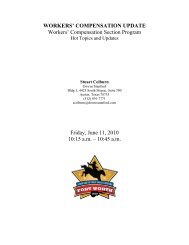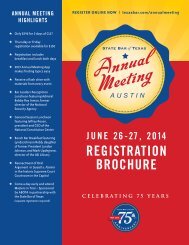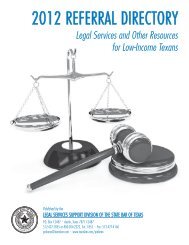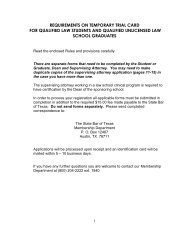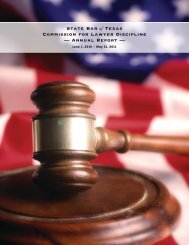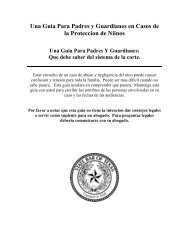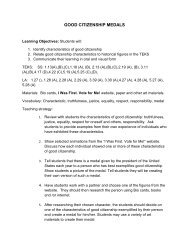MANAGING CLIENT EXPECTATIONS Family ... - State Bar of Texas
MANAGING CLIENT EXPECTATIONS Family ... - State Bar of Texas
MANAGING CLIENT EXPECTATIONS Family ... - State Bar of Texas
- No tags were found...
Create successful ePaper yourself
Turn your PDF publications into a flip-book with our unique Google optimized e-Paper software.
<strong>MANAGING</strong> <strong>CLIENT</strong> <strong>EXPECTATIONS</strong><strong>Family</strong> Law Section ProgramSpeakers:Wendy S. BurgowerHouston, <strong>Texas</strong>Brian L. WebbDallas, <strong>Texas</strong>Authors:Kay RedburnDallas, <strong>Texas</strong>Natalie L. WebbDallas, <strong>Texas</strong>G. Thomas VickWeatherford, <strong>Texas</strong>Thursday, June 10, 20101:30 p.m. – 2:15 p.m.
OFFICES & POSITIONS:PAST CHAIR, FAMILY LAW SECTION, STATE BAR OF TEXASPAST CHAIR, TEXAS CHAPTER AMERICAN ACADEMY <strong>of</strong> MATRIMONIALLAWYERSPAST PRESIDENT, TEXAS ACADEMY <strong>of</strong> FAMILY LAW SPECIALISTSPAST CHAIR, FAMILY LAW SECTION, DALLAS BAR ASSOCIATIONBOARD OF GOVERNORS, AMERICAN ACADEMY <strong>of</strong> MATRIMONIAL LAWYERSBOARD OF GOVERNORS, USA CHAPTER INTERNATIONAL ACADEMY <strong>of</strong>MATRIMONIAL LAWYERSPRESIDENT, AMERICAN ACADEMY <strong>of</strong> MATRIMONIAL LAWYERSFOUNDATIONSECTION REPRESENTATIVE TO STATE BAR OF TEXAS BOARD OFDIRECTORSSECRETARY, TEXAS FAMILY LAW FOUNDATIONCO-CHAIR, PATTERN JURY CHARGE COMMITTEE, FAMILY LAW, STATE BAROF TEXASPAST CHAIR, FAMILY LAW COMMITTEE, INTERNATIONAL SECTION,AMERICAN BAR ASSOCIATIONMEMBER, EXAM COMMISSION, AMERICAN ACADEMY <strong>of</strong> MATRIMONIALLAWYERSPAST MEMBER, CONTINUING LEGAL EDUCATION COMMITTEE, STATE BAR<strong>of</strong> TEXASPAST MEMBER, FAMILY LAW EXAM COMMITTEE, TEXAS BOARD OF LEGALSPECIALIZATIONPAST MEMBER, FORMBOOK COMMITTEE, TEXAS FAMILY PRACTICEMANUALSERVED AS SPECIAL PROSECUTOR, STATE BAR <strong>of</strong> TEXAS COMMISSIONFOR LAWYER DISCIPLINEPAST MEMBER, FEE DISPUTE COMMITTEE, DALLAS BAR ASSOCIATION
COURSE DIRECTOR:ADVANCED FAMILY LAW COURSE, STATE BAR <strong>of</strong> TEXAS (won national awardfor excellence)MARRIAGE DISSOLUTION COURSE, STATE BAR <strong>of</strong> TEXASTRIAL INSTITUTE, TEXAS ACADEMY <strong>of</strong> FAMILY LAW SPECIALISTSNEW FRONTIERS IN FAMILY LAW, STATE BAR <strong>of</strong> TEXASAMERICAN ACADEMY <strong>of</strong> MATRIMONIAL LAWYERS WINTER MEETINGAMERICAN ACADEMY <strong>of</strong> MATRIMONIAL LAWYERS SPRING MEETINGADR TRAINING:CERTIFIED FAMILY LAW MEDIATORCERTIFIED FAMILY LAW ARBITRATOR (AAML)COLLABORATIVE LAW TRAININGMEMBERSHIPS:AMERICAN COLLEGE <strong>of</strong> FAMILY TRIAL LAWYERSAMERICAN ACADEMY <strong>of</strong> MATRIMONIAL LAWYERSAMERICAN ACADEMY <strong>of</strong> MATRIMONIAL LAWYERS FOUNDATIONINTERNATIONAL ACADEMY <strong>of</strong> MATRIMONIAL LAWYERSTEXAS ACADEMY <strong>of</strong> FAMILY LAW SPECIALISTSAMERICAN BAR ASSOCIATION (FAMILY LAW SECTION & INTERNATIONALLAW SECTION)STATE BAR <strong>of</strong> TEXASTEXAS BAR FOUNDATIONDALLAS BAR ASSOCIATION (FAMILY LAW SECTION)DALLAS BAR FOUNDATIONTARRANT COUNTY FAMILY LAW BAR ASSOCIATIONTEXAS CENTER FOR LEGAL ETHICS & PROFESSIONALISMTEXAS FAMILY LAW FOUNDATION
INCLUDING THE VISITING JUDICIARY: INAPPROPRIATE BEHAVIOR” 1999;“DEFENDING AGAINST EXOTIC PROPERTY DIVISION THEORIES” 1999;“CHARACTERIZATION AND TRACING” 2000; “RELOCATION: SHOULD I STAY,OR CAN I GO?” 2000; “ORGANIZING THE TRIAL NOTEBOOK” 2000, 2001;“TEMPORARY ORDERS: HOW TO LOOK PREPARED EVEN IF YOU MET YOUR<strong>CLIENT</strong> YESTERDAY”, 2001; “GRANDPARENTS, WHERE THEY STAND NOW:TROXEL, AN ANALYSIS OF THE U.S. SUPREME COURT RULING” 2001; “ALLTHOSE WITH STANDING, STEP FORWARD....NOT SO FAST GRANDMA!POST-TROXEL THIRD PARTY STANDING TO BRING SAPCR’S, ANDREPRESENTING EXTENDED FAMILY AND NON-FAMILY MEMBERS” 2001;“NEW BOUNDARIES FOR GRANDPARENTS VISITATION” 2001; “DEALINGWITH ABUSIVE LAWYERS AND TACTICS” 2002; “JURISDICTION, VENUE,TRANSFER AND STANDING” 2003; “INTERNATIONAL ISSUES AND THEHAGUE CONVENTION” 2005;“DEALING WITH DIFFICULT <strong>CLIENT</strong>S IN ADIVORCE” 2006; “TRYING THE CUSTODY CASE” 2007; “CHARACTERIZATIONAND TRACING” 2007 “LEGISLATIVE UPDATE” 2008.Speaker: Marriage Dissolution Course, <strong>State</strong> <strong>Bar</strong> <strong>of</strong> <strong>Texas</strong>, 1985, 1986, 1987,1990, 1991, 1992, 1993, 1994, 1996, 1997, 1998, 1999, 2000, 2001, 2003, 2005,2006, 2007; Advanced <strong>Family</strong> Law Course, <strong>State</strong> <strong>Bar</strong> <strong>of</strong> <strong>Texas</strong>, 1987, 1988,1989, 1990, 1991, 1992, 1993, 1994, 1995, 1996, 1997, 1998, 1999, 2000, 2001,2002, 2003, 2004, 2005, 2007, 2008, 2009; Second World Congress on <strong>Family</strong>Law and the Rights <strong>of</strong> Children and Youth, 1997; New Frontiers in MaritalProperty Law, 1996, 1997, 1998, 1999, 2008; North American Symposium onInternational Child Abduction, 1993; SMU <strong>Texas</strong> <strong>Family</strong> Litigation Course,1987; Annual Conference <strong>of</strong> <strong>Texas</strong> Association <strong>of</strong> Domestic Relations Offices,1987; Panel on Joint Custody, 1983; Dallas <strong>Bar</strong> <strong>Family</strong> Law Section; DallasAssociation <strong>of</strong> Young Lawyers, “A Day With the Experts,” 1986, 1987; <strong>Family</strong>Law in <strong>Texas</strong>, Legal Education Institute, 1988, 1989, 1990; Midyear Meeting,American Academy <strong>of</strong> Matrimonial Lawyers, 1988, 1990, 1993, 2001, 2008; TrialInstitute, <strong>Texas</strong> Academy <strong>of</strong> <strong>Family</strong> Law Specialists, 1988, 1990, 1991, 1992,1993, 1994, 1995; Advanced <strong>Family</strong> Law Drafting Course, 1992; Tarrant County<strong>Family</strong> Law <strong>Bar</strong> Association, 1988, 1995, 1998, 2001; <strong>Family</strong> Law for theExperienced Non-Specialist, <strong>State</strong> <strong>Bar</strong> <strong>of</strong> <strong>Texas</strong>, 1989; Regional JudicialConference, 1990; South <strong>Texas</strong> College <strong>of</strong> Law, <strong>Family</strong> Law for the GeneralPractitioner and Legal Assistant, 1992; Pro Bono Training Seminar,International Child Abduction Treaty, 1992; Annual Meeting <strong>Family</strong> LawSection, <strong>State</strong> <strong>Bar</strong> <strong>of</strong> <strong>Texas</strong>, 1992; Dallas Chapter <strong>of</strong> the <strong>Texas</strong> Society <strong>of</strong>Certified Public Accountants Annual Meeting, 1993, 1994, 1995; <strong>Family</strong> LawPractice Institute, University <strong>of</strong> Houston Law Center, 1994, 1995, 1996, 1997,1999, 2000; <strong>Texas</strong> <strong>Family</strong> Law for the Paralegal, 1995, 1997, 1999; Nevada<strong>Family</strong> Law Seminar, 2007.
TOP TEN WAYS TO SHOW THE <strong>CLIENT</strong> YOU CAREAND AVOID A GRIEVANCEPresented by:BRIAN L. WEBB, DallasThe Webb <strong>Family</strong> Law FirmWritten by:KAY REDBURN, DallasNATALIE L. WEBB, DallasThe Webb <strong>Family</strong> Law Firm<strong>State</strong> <strong>Bar</strong> <strong>of</strong> <strong>Texas</strong>33 RD ANNUAL MARRIAGEDISSOLUTION INSTITUTEMay 6-7, 2010San AntonioCHAPTER 7.3
KAY REDBURNThe Webb <strong>Family</strong> Law Firm325 N. St. Paul, Suite 4450Dallas, <strong>Texas</strong> 75201(214) 871-2730(214) 871-9339 FAXCertifications/ Board Certified Paralegal - <strong>Family</strong> Law - <strong>Texas</strong> Board <strong>of</strong> Legal Specialization, 2003Awards:Paralegal <strong>of</strong> the Year, 2006, Dallas Area Paralegal AssociationPresident’s Award, <strong>Texas</strong> Academy <strong>of</strong> <strong>Family</strong> Law Specialists, 2008Volunteer <strong>of</strong> the Year, Mesquite Police Department, 2008Employment:1996 - present Sr. Paralegal to Brian L. Webb, The Webb <strong>Family</strong> Law Firm, P.C.1995-1996 Owner, Per Diem Legal Resource, Free lance legal assistant/paralegal services to attorneysin the area <strong>of</strong> family law1992- 1995 Legal Assistant/paralegal to Brian L. Webb; McCurley, Webb, Kinser, McCurley &Nelson, L.L.P.1990-1992 Legal Assistant/paralegal to Charles H. Robertson, Laurence DePlaza; Robertson &Holmes, Dallas, <strong>Texas</strong>1985-1990 Legal Assistant/paralegal to Thomas C. Railsback, Dallas, <strong>Texas</strong>1983-1985 Legal Assistant to Leota H. Alexander, Dallas, <strong>Texas</strong>Education:University <strong>of</strong> <strong>Texas</strong> at Austin, 1973-1975, major: PsychologyEl Centro Community College, 12 hrs, Paralegal Studies Assoc. Degree ProgramMesquite Citizen Police Academy, 21 st class, 2005Offices/Committees: Ethics and Pr<strong>of</strong>essional Responsibility Coordinator, National Federation <strong>of</strong> ParalegalAssociations, 2005-2007;Founding Member, Paralegal Advisory Commission, <strong>Family</strong> Law, <strong>Texas</strong> Board <strong>of</strong> LegalSpecialization, 1993- 2000; Member 2005-2007; chair 2007 -presentMember, <strong>State</strong> <strong>Bar</strong> <strong>of</strong> <strong>Texas</strong> Standing Committee on Paralegals, 1995-present;Paralegal Liaison/Parliamentarian, <strong>Texas</strong> Academy <strong>of</strong> <strong>Family</strong> Law Specialists, 2004-present;Paralegal Committee, <strong>Family</strong> Law Section, <strong>State</strong> <strong>Bar</strong> <strong>of</strong> <strong>Texas</strong>, 1994-present;Chair, Pr<strong>of</strong>essional Ethics Committee, Legal Assistants Division, <strong>State</strong> <strong>Bar</strong> <strong>of</strong><strong>Texas</strong>, 1994-1996;Paralegal Advisory Committee, El Centro College, 1993-1996, Chair 1996-present;Chair, Ethics Committee, Dallas Area Paralegal Association, 2009 - present;Legal Assistants' Liaison, <strong>Family</strong> Law Section, Dallas <strong>Bar</strong> Association, 1994-1997;Member, Dallas OK Commission, 1997Local Subcommittee Chair, Pr<strong>of</strong>essional Ethics Committee, Legal AssistantsDivision, <strong>State</strong> <strong>Bar</strong> <strong>of</strong> <strong>Texas</strong>, 1991-1994;Membership Vice-President, Dallas Association <strong>of</strong> Legal Assistants, 1991-1993;Assistant Chair, <strong>Family</strong> Law Section, Dallas Association <strong>of</strong> Legal Assistants,1993;Assistant Newsletter Editor, Dallas Association <strong>of</strong> Legal Assistants, 1990-1992Mesquite Citizen Police Academy Alumni Association, Vice-President, 2007-2011Memberships:Paralegal Division, <strong>State</strong> <strong>Bar</strong> <strong>of</strong> <strong>Texas</strong>
Authorand Speaker:<strong>Texas</strong> Academy <strong>of</strong> <strong>Family</strong> Law Specialists<strong>Family</strong> Law Section, <strong>State</strong> <strong>Bar</strong> <strong>of</strong> <strong>Texas</strong><strong>Family</strong> Law Section, Dallas <strong>Bar</strong> Association<strong>Texas</strong> <strong>Family</strong> Law FoundationCollege <strong>of</strong> the <strong>State</strong> <strong>Bar</strong> <strong>of</strong> <strong>Texas</strong>, Legal Assistants Division - Charter MemberDallas Area Paralegal AssociationMesquite Citizen Police Academy Alumni Association“The Paralegal’s Role in the <strong>Family</strong> Law Jury Trial”, with panel: Dr. Jan Delipsey, JohnT. Eck, Hon. Mary Ellen Hicks, Janet McCullar Vavra, Mike McCurley, and Glenn A.Perry, 35 th Annual Advanced <strong>Family</strong> Law Course, August 2009“You and Your Shadow Paralegal” with Brian L. Webb, Jim Loveless, Pam Farris,Advanced <strong>Family</strong> Law Drafting Course, December 2008“The Team Approach in a <strong>Family</strong> Law Practice” with Brian L. Webb, 30 th AnnualMarriage Dissolution Bootcamp, May, 2007“Protecting your Attorney/Pr<strong>of</strong>essionalism from the Paralegal Standpoint” 32 nd AnnualAdvanced <strong>Family</strong> Law Boot Camp, August 2006Co-Course Director with Heather King, “Practical Aspects <strong>of</strong> Enhancing your LegalPractice” 29 th Annual Marriage Dissolution Institute Boot Camp, April 2006Co-Course Director with Brian L. Webb, “The Attorney and Legal Assistant Team: YouCan’t Do It Alone!” 28 th Annual Marriage Dissolution Institute Boot Camp, April 2005“Pathway to Your Future - <strong>Family</strong> Law”, Dallas Area Paralegal Association Career Day,2005“Ethics and the Paralegal”, Legal Assisting in <strong>Texas</strong>, November, 2004“Ethics for the Paralegal” , Paralegal Career Symposium, Charting your Course, DallasArea Paralegal Association, Fort Worth Paralegal Association, <strong>State</strong> <strong>Bar</strong> <strong>of</strong> <strong>Texas</strong> LegalAssistants Division, September 11, 2004“Use and Abuse <strong>of</strong> Legal Assistants in a <strong>Family</strong> Law Practice” , with Charles Hodges,Heather King, Julie Pruett Crawford and Melissa Johnston, 28 th Annual Advanced <strong>Family</strong>Law Course, August, 2002“The Utilization <strong>of</strong> Legal Assistants in a Law Office and Legal Assistant Ethics”, CollinCounty Legal Association, April, 2002“Custody Issues and Grandparent Access”, with Miriam L. Ackels, Legal AssistantUniversity, September, 2001“Effective Use <strong>of</strong> Legal Assistants in a <strong>Family</strong> Law Practice”, with Brian L. Webb, GaryNickelson and Coye Conner, Jr., 27 th Annual Advanced <strong>Family</strong> Law Course, August, 2001“Taking the Case to Trial”, with Brian L. Webb, <strong>Texas</strong> <strong>Family</strong> Law Practice forParalegals, March, 2001“Organizing the Trial Notebook”, with Brian L. Webb, James Loveless, Kimberly Naylorand Sherri Evans, The Ultimate Trial Notebook: <strong>Family</strong> Law, December, 2000“Economics <strong>of</strong> Running a Law Practice”, with James Loveless, Dennis Brewer, DouglasHarrison, Curtis Loveless and Roy Moore, 25 th Annual Advanced <strong>Family</strong> Law Course,August, 1999“Handling Custody Disputes”, with Brian L. Webb, <strong>Texas</strong> <strong>Family</strong> Law Practice for
Paralegals, April, 1999“Effective Utilization <strong>of</strong> Legal Assistant and Staff”, with Brian L. Webb, Coye Conner, Jr.,and <strong>Bar</strong>bara Calcote; 24 th Annual Advanced <strong>Family</strong> Law Course, August, 1998“Utilization <strong>of</strong> the Legal Assistant”, with Brian L. Webb, Tarrant County <strong>Family</strong> Law <strong>Bar</strong>Association Meeting, June 1998“Ethics in Your Practice”, Advanced Civil Trial Seminar, Legal Assistants Division, <strong>State</strong><strong>Bar</strong> <strong>of</strong> <strong>Texas</strong>, April 1998“Basic Malpractice Prevention”, Nuts and Bolts General Practice Skills Course, LegalAssistants Division, <strong>State</strong> <strong>Bar</strong> <strong>of</strong> <strong>Texas</strong> and Dallas Association <strong>of</strong> Young Lawyers,October 1996“Practical(ly) Legal Tips for Making Money with Your Legal Assistant”, Dallas <strong>Bar</strong>Association <strong>Family</strong> Law Section Meeting (with Brian L. Webb), September 1996“Effective Use <strong>of</strong> Legal Assistants - How to Make Time and Money”, Advanced <strong>Family</strong>Law Course, Dallas, <strong>Texas</strong> (co-authored with <strong>Bar</strong>bara Calcote, Brian L. Webb and CoyeConner, Jr.) August 1995“Scruples”, quarterly column on ethics in <strong>Texas</strong> Paralegal Journal, (1995-1996)“<strong>Texas</strong> <strong>Family</strong> Law Practice for Paralegals”, Clearwater Information Systems, Inc., Dallas,1995 - Ethics - What is it and Why Should You Care? and How to Recognize and Deal withthe Battered Wife (article by Christine Albano)“<strong>Texas</strong> <strong>Family</strong> Law Practice for Paralegals”, Clearwater Information Systems, Inc.,Arlington, 1994 - Overview <strong>of</strong> the <strong>Texas</strong> Disciplinary Rules <strong>of</strong> Pr<strong>of</strong>essional Conduct(article written with Mike McCurley)“The Trial Notebook”, co-authored with Mike McCurley, <strong>Family</strong> Law Handbook for theParalegal, Pr<strong>of</strong>essional Education Systems, Inc., Dallas/Houston, 1992“Child Support Cases - How to Turn Lead into Gold”, co-authored with Charles H.Robertson, <strong>Family</strong> Law - The Team Approach for the Legal Assistant and the Lawyer,<strong>State</strong> <strong>Bar</strong> <strong>of</strong> <strong>Texas</strong>, Austin, <strong>Texas</strong>, 1990; and <strong>Family</strong> Law Handbook for the Paralegal,Pr<strong>of</strong>essional Education Systems, Inc., Dallas/Houston, 1992“Communication - the Key to Gaining and Maintaining the Confidence <strong>of</strong> the Client andthe Opposition”, co-authored with Harry Tindall, Scott Cook, Luanne Riley-Thomas andN. Roberts, <strong>Family</strong> Law for Legal Assistants and Attorneys, <strong>State</strong> <strong>Bar</strong> <strong>of</strong> <strong>Texas</strong>, CorpusChristi, <strong>Texas</strong>, 1987
NATALIE L. WEBB!"#$%#&&$'()*+,$-(.$'*/)0$1232456$72$892$1(:+$89/##90$8:*9#$;;60$!#?(>$@65$5T/+*DU9CD$](++$(DP$-##$1(/\$S:D*C/$3CD>#/R(9C/,AUTHOR AND SPEAKERLegislative Update: <strong>Family</strong> Law Section Perspective0$3CIT:9"C/$.*9"$^2$7*JC+#$_C,+#>0$TPR(DJ#P'()*+,$-(.$3C:/>#0$8(D$TD9CD*C0$!#?(>0$T:U:>9$AAIA;0$50$T:>9*D0$!`$S(D:(/,$5KI4#0$=(++(>0$!#?(>0$T:U:>9$4$I$Z0$5
Top Ten Ways to Show the Client You Care and Avoid a GrievanceTABLE OF CONTENTSTOP TEN WAYS TO SHOW THE <strong>CLIENT</strong> YOU CARE AND AVOID A GRIEVANCE ........................................ 1RULE 1.03 COMMUNICATION .................................................................................................................................. 31.04 FEES (EFFECTIVE MARCH 1, 2005) .................................................................................................................. 4AFFIDAVIT.................................................................................................................................................................... 5i
Top Ten Ways to Show the Client You Care and Avoid a GrievanceTOP TEN WAYS TO SHOW THE<strong>CLIENT</strong> YOU CARE AND AVOID AGRIEVANCE10. Don’t lie to them about anything. Honesty maybe painful, but it IS the best policy.9. Make sure client’s expectations are realistic.Don’t promise what you can’t deliver. And don’tsuccumb to their unrealistic expectations.8. Don’t get emotionally involved in their case.Maintain your pr<strong>of</strong>essional detachment (which iswhy it’s called “pr<strong>of</strong>essional”).7. Give them something for free every once in awhile. A “no charge” phone call for example cango a long way toward keeping clients happy. Andmake sure you know they know you’re doing it.A big “NO CHARGE” on their bill is alwayswelcome by clients.• “I don’t care how much it costs....”• “I didn’t have any confidence in my fourprior attorneys...”• “The trial starts next week. You can beready, right?”• “I just know he’s hiding money somewhere”• “I want my kids half the time so I don’t haveto pay any child support”• “What countries are not signatories to theHague Convention on International ChildAbduction?”6. Be up front (and do it in writing) about fees andcosts.5. A busy client is a happy client. Give them workto do. Remind them that whatever they can do tohelp saves them money (and you time).4. Copy the client in everything that comes in orgoes out on their case. Everything.3. Return client calls.2. Return client calls.1. Most importantly: RETURN <strong>CLIENT</strong> CALLS.The “failure to keep the client informed”, Rule103(a) is the most frequent violation by attorneys <strong>of</strong>the <strong>Texas</strong> Disciplinary Rules <strong>of</strong> Pr<strong>of</strong>essional Conduct.And if you show the client you care but still can’tavoid a grievance:1. If it didn’t happen in writing, IT DIDN’THAPPEN. Document everything. Keep copies.2. If they won’t follow your advice, get them to sign“I’m a Dumbass” Affidavit.3. Put reminders about client’s duty to supplementdiscovery in each monthly billing statement.4. Watch for red flags before taking a case.Examples:1
!"#$!%&$'()*$+"$,-".$+-%$/01%&+$2"3$/(4%$(&5$67"15$($841%7(&9%take protective steps) such as initiating the appointment <strong>of</strong> a guardian. The lav,ryer should !""#tosuch appointment or take othe.r protecth'e steps \:o..'hen it reasonably appears advisable to do soin order to serve the client's best interests. See Rule 1.05 (c)(4), dO) and (d)(2)(i) in regard tothe lav')1er's right to re\'eal to the court the facts reasonably necessary to secure the guardianshipor other protective order.Rule 1.03 COl1ullunication(a) A lawyer shall keep a client reasonably informed about the status <strong>of</strong> a matter and promptlycomply with reasonable requests for information.(b) A lawyer shall explain a matter to the extent reasonably necessary to permit the client !"#make informed decisions regarding the representation.COtnlnent:$%# The client should have sufficient information to participate intelligently in decisionsconcerning the objectives <strong>of</strong> the representation and the means by which they are to be pursued)to the extent the client is \villing and able to do so. For example) a lawyer negotiating on behalf<strong>of</strong> a client should provide the client with facts relevant to the matter! inform the client <strong>of</strong>communications from another party and take other reasonable steps to permit the client tomake a decision regarding a serious <strong>of</strong>fer from another party. A lawyer who receives fromopposing counsel either an <strong>of</strong>fer <strong>of</strong> settlement in a civil controversy or a pr<strong>of</strong>fered plea bargainin a criminal case should promptly inform the client <strong>of</strong> its substance unless prior discussionswith the client ha\'e left it clear that the proposal will be unacceptable. See Comment 2 to Rule1.02.2. Adequacy <strong>of</strong> comrnunication depends in part on the kind <strong>of</strong> advice or assistance involved.For exarnple! in negotiations ",.'here there is tirne to explain a proposal the lawyer should reviewall irnportant provisions with the client before proceeding to an agreement. In litigation alawyer should explain the general strategy and prospects <strong>of</strong> success and ordinarily shouldconsult the client on tactics that might injure or coerce others. On the other hand! a lavlryerordinarily cannot be expected to describe trial or negotiation strategy in detail. Moreover! incertain situations practical exigency may require a lmvyer to act for a client without priorconsultation. The guiding principle is that the lawyet should reasonably fulfill clientexpectations for information consistent v,lith the duty to act in the clienes best interests) andthe client.s overall requirements as to the character <strong>of</strong> representation.3. ()rdinarily, the information to be provided is that appropriate for a client who is acomprehending and responsible adult. Howe\'cr, fully informing the client according to thisstandard may be impractical, as for eX
!"#$!%&$'()*$+"$,-".$+-%$/01%&+$2"3$/(4%$(&5$67"15$($841%7(&9%Where many routine matters are involved, a system <strong>of</strong>limited or occasional reporting may bearranged with the client.Withholding Information4. In some circumstances, a 1
!"#$!%&$'()*$+"$,-".$+-%$/01%&+$2"3$/(4%$(&5$67"15$($841%7(&9%THE STATE OF TEXAS )COUNTY OF DALLAS )AFFIDAVITBEFORE ME, the undersigned authority, on this day personally appeared_________________ who, being by me duly sworn, upon oath stated:"I, _________________, am the Petitioner in Cause # _________________ in the ____ DistrictCourt in and for Dallas County, <strong>Texas</strong>. I have consulted with____________________________,a duly licensed attorney practicing at __________________________________________________.He has advised me regarding discovery and its relationship to any agreement that I may want toenter into as a settlement <strong>of</strong> this Divorce action. I understand and acknowledge that he has advisedme not to enter into any agreement and further, not to settle the divorce now pending in this causewithout following his advice. He has advised me that he does not feel that I am sufficiently aware<strong>of</strong> my husband's income or the value and extent <strong>of</strong> the community estate and has advised me thatI should go forward with discovery measures to fully determine the extent and value <strong>of</strong> thecommunity estate. He has advised me that he does not feel I am aware <strong>of</strong> any <strong>of</strong> my husband’sseparate property assets against which I or the community estate may have an equitable interest orreimbursement claim. He has further advised me that due to the lack <strong>of</strong> knowledge concerning thecomplete assets and liabilities, including tax liability, <strong>of</strong> the community estate or my husband’sseparate property estate in which I may have an interest, he cannot adequately advise me regardingthe terms set forth in any agreement. I hereby acknowledge and state that I have instructed myattorney, against his advice, not to obtain the appropriate information necessary to ascertain theextent and value <strong>of</strong> the community estate or my husband’s separate estate in which I may have anAFFIDAVIT - Page 1 <strong>of</strong> 5:
!"#$!%&$'()*$+"$,-".$+-%$/01%&+$2"3$/(4%$(&5$67"15$($841%7(&9%interest, including liabilities. My attorney has advised me that only through full discovery duringthe pendency <strong>of</strong> this litigation can these matters be determined with any accuracy. I have advisedhim that I do not want to contest this matter in any way and that, despite his advice to the contrary,it is my desire to enter into an agreement.He has advised me that depositions, requests for disclosure, requests for production, requestsfor admissions, subpoenas duces tecum, interrogatories, appraisals and other discovery measures areavailable through which we could determine the actual value and extent <strong>of</strong> the community estate andmy husband’s separate estate in which I may have an interest, including all liabilities as well asassets. He has further advised me that the Court, upon hearing all <strong>of</strong> the evidence regarding myhusband's income and the assets and liabilities <strong>of</strong> the community, might award me adisproportionately larger share <strong>of</strong> the community estate than would be awarded to my husband.Further, he has advised me that the Court, upon hearing all the evidence regarding the reduction <strong>of</strong>both secured and unsecured liabilities <strong>of</strong> the community and my husband’s separate property estatethrough contributions from the community and my separate estate, might award the community ormy separate estate a claim <strong>of</strong> equitable interest or reimbursement against the benefitted estate. Hehas further advised me that once I have settled this case and a Decree <strong>of</strong> Divorce has been enteredbased upon an agreement, I will not have an opportunity to avail myself <strong>of</strong> discovery measuresthereafter, nor will I be able to renegotiate the terms <strong>of</strong> the agreement or in any way alter the terms<strong>of</strong> the agreement. I understand that an agreement will be final and binding upon me and that neithermy attorney nor the Court will have any meaningful ability to revise or alter the agreement in anyway. I further understand that should I wish to seek a review by the Court <strong>of</strong> the agreement after aDecree <strong>of</strong> Divorce has been entered by the Court, the remedies available to me, if any, will beAFFIDAVIT - Page 2 <strong>of</strong> 5;
!"#$!%&$'()*$+"$,-".$+-%$/01%&+$2"3$/(4%$(&5$67"15$($841%7(&9%substantially less than those available to me while the divorce is still pending, and that the process<strong>of</strong> seeking such a review by the Court will be substantially more expensive and less likely to besuccessful than pursuing my rights to discovery during the pendency <strong>of</strong> the divorce. I furtherunderstand that by foregoing discovery at this time and going ahead with an agreement against myattorney’s advice I am almost certainly waiving the right to any review <strong>of</strong> the agreement by a courtand that I will be, because <strong>of</strong> my decision to forego discovery, bound by the agreement no matterwhat facts or evidence, including fraud, I may discover in the future. Having a full understanding<strong>of</strong> this and acknowledging this advice, it is nevertheless my desire to enter into an agreement.My attorney has advised me that he is requiring me to execute this affidavit as a condition<strong>of</strong> his continued representation <strong>of</strong> me since I am entering into an agreement against his advice. Hehas specifically advised me that I am relieving him <strong>of</strong> any liability for the nature and terms <strong>of</strong> theagreement, as well as any consequences <strong>of</strong> an agreement, by executing this affidavit. He has advisedme that be believes that by going forward with an agreement without discovery and against hisadvice I am making a foolish mistake and taking an enormous risk. He has advised me that he isrequiring me to execute this affidavit specifically to make it unequivocally clear that he has advisedme against foregoing discovery and entering into an agreement and that I hereby relieve him <strong>of</strong> anyand all potential liability or responsibility whatsoever.In summary, it is the advice <strong>of</strong> my attorney that I do not enter into an agreement and that nosettlement <strong>of</strong> this matter be entered into until such time as full discovery measures have been utilizedin order to determine the full extent and character <strong>of</strong> the community or separate property at stakein this cause, including liabilities as well as assets and any claims for equitable interest orreimbursement. I understand that by entering into an agreement against my attorney’s advice, theAFFIDAVIT - Page 3 <strong>of</strong> 5
!"#$!%&$'()*$+"$,-".$+-%$/01%&+$2"3$/(4%$(&5$67"15$($841%7(&9%agreement will be final and binding upon me and that I will have no recourse thereafter to alter orchange the agreement or avoid liability created by the agreement. I acknowledge that this advicewas given to me by ________________ and it is my desire to enter into a settlement <strong>of</strong> all issuesbefore the Court without utilizing discovery measures. It is my desire not to contest this matter inany way. For this reason, I am executing this Affidavit to acknowledge that this settlement is beingentered into contrary to my attorney's advice and to relieve my attorney, ________________ fromany and all liability for the consequences <strong>of</strong> my decision.This Affidavit is executed <strong>of</strong> my own free will and I have not been coerced, threatened,bribed, or <strong>of</strong>fered any inducement or promise to execute an Affidavit. Any settlement that I enterinto is made with full awareness <strong>of</strong> the possible detriment to me and with knowledge that I amalmost certainly depriving myself <strong>of</strong> certain rights and benefits which I may have obtained had Iheeded the advice <strong>of</strong> my attorney and used the discovery measures available to me to determine theexact nature, character and extent <strong>of</strong> the community or separate estates prior to settlement <strong>of</strong> thiscause <strong>of</strong> action."_____________________________________________________(name)SUBSCRIBED AND SWORN TO before me on the ____ day <strong>of</strong> ________, 20__, byAFFIDAVIT - Page 4 <strong>of</strong> 5=
!"#$!%&$'()*$+"$,-".$+-%$/01%&+$2"3$/(4%$(&5$67"15$($841%7(&9%_________________._____________________________________NOTARY PUBLIC<strong>State</strong> <strong>of</strong> <strong>Texas</strong>________________________WITNESSAFFIDAVIT - Page 5 <strong>of</strong> 5>
<strong>MANAGING</strong> <strong>CLIENT</strong>S <strong>EXPECTATIONS</strong> AT TRIALG. THOMAS VICK, JR.Vick Carney & Smith, L.L.P.111 York AvenueWeatherford, <strong>Texas</strong> 76086(817) 596-5533tvick@vcslaw.com<strong>State</strong> <strong>Bar</strong> <strong>of</strong> <strong>Texas</strong>MARRIAGE DISSOLUTION BOOT CAMPMay 5, 2010San AntonioCHAPTER 5
G. Thomas Vick, Jr.Vick Carney & Smith, L.L.P.111 York AvenueWeatherford, <strong>Texas</strong> 76086(817) 596-5533tvick@vcslaw.comBoard Certified-<strong>Family</strong> Law, <strong>Texas</strong> Board <strong>of</strong> Legal SpecializationFellow--American Academy <strong>of</strong> Matrimonial LawyersFellow--International Academy <strong>of</strong> Matrimonial Lawyers<strong>Bar</strong> Activities<strong>State</strong> <strong>Bar</strong> <strong>of</strong> <strong>Texas</strong>Board <strong>of</strong> Directors 2005-2008Commissioner, <strong>Texas</strong> Access to Justice Commission 2006-2009Chair, Supreme Court Task Force to Expand Legal Services Delivery (2006-2007)Chair, <strong>Family</strong> Law Section (2004-2005)Member, <strong>Family</strong> Law Section Council (1991-2006)Chair, <strong>Family</strong> Law Section Council Pro Bono Committee (1997-1999)Member, Editorial Committee, <strong>Texas</strong> <strong>Family</strong> Law Practice Manual (1991-1997)<strong>Texas</strong> Academy <strong>of</strong> <strong>Family</strong> Law SpecialistsPresident (2004-2005)Board Member (1994-2006)(Former Editor, <strong>Family</strong> Law Forum)American Academy <strong>of</strong> Matrimonial Lawyers (National Officer: Treasurer 2006-Present, Secretary 2003,Parliamentarian 2002; <strong>Texas</strong> Chapter President 2000-2001)American <strong>Bar</strong> Association (1981-2008) (House <strong>of</strong> Delegates 1981)<strong>Texas</strong> <strong>Bar</strong> Foundation, Life FellowAmerican Academy <strong>of</strong> Matrimonial Lawyers Foundation, Life Fellow<strong>Texas</strong> <strong>Family</strong> Law Foundation, Life FellowTarrant County <strong>Family</strong> <strong>Bar</strong> AssociationParker County <strong>Bar</strong> Association (Past President)EducationAustin College, Sherman, <strong>Texas</strong>, BA 1977South <strong>Texas</strong> College <strong>of</strong> Law, Houston, <strong>Texas</strong>, JD 1981Course Director2007 New Frontiers in Marital Property, Memphis, TN2002 Advanced <strong>Family</strong> Law Course, Dallas, TX2000 Marriage Dissolution Institute, Fort Worth, TX<strong>Texas</strong> Academy <strong>of</strong> <strong>Family</strong> Law Specialists 13 th Annual Trial Institute (1999), Las Vegas, NVAssistant Course Director, <strong>Texas</strong> Academy <strong>of</strong> <strong>Family</strong> Law Specialists 11 th and 12 th Annual Trial Institutes(1997, 1998), New Orleans, LAPublications & Lectures1995 to CurrentEffective Presentation <strong>of</strong> Evidence, Panel Discussion, 2009 Advanced <strong>Family</strong> Law Course, Dallas, TXManaging Client Expectations, 2009 <strong>Family</strong> Law Basic Training, Dallas, TXManaging Client Expectations, 2009 Am. Academy <strong>of</strong> Matrimonial Lawyers Mid-Year Meeting, Kauai, HISpoliation, 2008 Advanced <strong>Family</strong> Law Course, San Antonio, TXPossession Orders, 2007 Advanced <strong>Family</strong> Law Course, San Antonio, TX
Negotiation: You Can’t Try Them All, 2007 Marriage Dissolution Institute, El Paso, TXManaging Client Expectations; Trying the Property Case on a Shoestring; Top Ten Trial Tips, 2007 Nevada <strong>State</strong> <strong>Bar</strong><strong>Family</strong> Law Course, Ely, NVInternational Child Issues and the Hague Convention, 2006 Advanced <strong>Family</strong> Law Course, San Antonio, TXWhen the <strong>Texas</strong> SPO Won’t Work,2006 <strong>Texas</strong> Advanced Paralegal Seminar, Addison, TXDirect and Cross Examination, 2005 <strong>Family</strong> Law Basic Training, Dallas, TXLegislative Update, 2005 Associate Judge=s Conference, Austin, TXTemporary Orders, 2005 Poverty Law Conference, Austin, TXReforming Your Client=s Expectations, 2004 Legal Assistant=s University, Fort Worth, TXLife <strong>of</strong> a Grievance, 2004 Advanced <strong>Family</strong> Law Course, San Antonio, TXManaging Client Expectations, 2004 Marriage Dissolution Institute, Fort Worth, TXDealing With the Client From Hell, 2003 Advanced <strong>Family</strong> Law Course, San Antonio, TXSetting and Getting Fees, 2003 Marriage Dissolution Institute, Houston, TXSpoliation, 2001 Advanced <strong>Family</strong> Law Course, San Antonio, TXClosing the File, 2001 Marriage Dissolution Institute, Corpus Christi, TXGetting the Most Out <strong>of</strong> Your Discovery, The Ultimate Trial Notebook: <strong>Family</strong> Law (2000), New Orleans, LATop Ten Things in a <strong>Family</strong> Law Practice, 2000 Advanced <strong>Family</strong> Law Course, San Antonio, TXBankruptcy In Divorce, 1999 Advanced <strong>Family</strong> Law Course, Dallas, TXBankruptcy Meets <strong>Family</strong> Law, Univ. <strong>of</strong> TX School <strong>of</strong> Law 2 nd Annual TX Marital Property Inst. (1998), Austin, TXWorking as an Expert in <strong>Family</strong> Law Cases, 1998 Divorce Conference (Dallas Chapter, TX Society <strong>of</strong> CPA=s)Divorce vs. Bankruptcy--When Worlds Collide, 1998 Farm, Ranch and Agri-business Bankruptcy Inst., Lubbock, TXJurisdiction, 1998 Advanced <strong>Family</strong> Law Course, San Antonio, TXParent-Child Third Party Practice, 1998 Marriage Dissolution Institute, Austin, TXRecent Federal Legislation, 1998 Am. Academy <strong>of</strong> Matrimonial Lawyers Mid-Year Meeting, San Juan, PRCreative Divisions <strong>of</strong> Property, 1997 Advanced <strong>Family</strong> Course, San Antonio, TXTrying a Property Case on a Shoestring, 1997 Marriage Dissolution Institute, Dallas, TXRecent Interesting Cases, 1997 College <strong>of</strong> Advanced Judicial Studies, Houston, TXModification <strong>of</strong> Rights and Powers <strong>of</strong> a Joint Managing Conservator, 1996 Adv. Fam. Law Course, San AntonioEnforcement Workshop, 1996 Marriage Dissolution Institute, Corpus Christi, TXDirect Examination in a Property Case, TX Academy <strong>of</strong> Fam. Law Specialists 9 th Trial Inst. (1995), New OrleansHonors/Activities2009 American Academy <strong>of</strong> Matrimonial Lawyers Fellow <strong>of</strong> the Year2009 <strong>Texas</strong> Academy <strong>of</strong> <strong>Family</strong> Law Specialists Judge Sam Emison Award, “For Significant Contributionsto the Practice <strong>of</strong> <strong>Family</strong> Law in the <strong>State</strong> <strong>of</strong> <strong>Texas</strong>”2008 Dan R. Price Award; <strong>State</strong> <strong>Bar</strong> <strong>of</strong> <strong>Texas</strong> <strong>Family</strong> Law Section Outstanding <strong>Family</strong> Lawyer2008 <strong>State</strong> <strong>Bar</strong> <strong>of</strong> <strong>Texas</strong> Presidential Citation for Service to the <strong>Bar</strong>Named in 2003, 2004, 2005, 2007, 2008, 2009 <strong>Texas</strong> Monthly as a ASuperLawyer@Named in The Best Lawyers in America 1993 to currentNamed 1993 Southwest High School (Fort Worth, <strong>Texas</strong>) Distinguished GraduateMayor, City <strong>of</strong> Weatherford, <strong>Texas</strong> 1982-1986Trustee, Weatherford Independent School District 1995-2001
Managing Clients Expectations at TrialTABLE OF CONTENTSI. ! INTRODUCTION ................................................................................................................................................... 1!II. !ROLE OF THE ATTORNEY ................................................................................................................................. 1!A. ! The <strong>Texas</strong> Disciplinary Rules <strong>of</strong> Pr<strong>of</strong>essional Conduct .................................................................................. 1!B. !<strong>Texas</strong> Lawyers Creed ...................................................................................................................................... 1!III. !FEES ....................................................................................................................................................................... 3!A.! The Law Of Diminishing Appreciation ........................................................................................................... 3!B. !Using TDRPC to Set a Fee .............................................................................................................................. 3!C. !Forbidden Fees ................................................................................................................................................ 4!1. ! Unconscionable Fees ............................................................................................................................... 4!2. ! Fees in <strong>Family</strong> Law Matters .................................................................................................................... 5!D. !Getting Your Fees From The Court ................................................................................................................. 5!E. !Getting Out ...................................................................................................................................................... 6!IV. !TIME ....................................................................................................................................................................... 7!V. !OUTCOME ............................................................................................................................................................. 8!A.! Property ........................................................................................................................................................... 8!B. !Suits Affecting the Parent Child Relationship .............................................................................................. 8!VI.! CONCLUSION ....................................................................................................................................................... 8!APPENDICESSAMPLE PROPOSED DIVISION ....................................................................................................................... 11i
Managing Clients Expectations at Trial<strong>MANAGING</strong> <strong>CLIENT</strong><strong>EXPECTATIONS</strong> AT TRIALI. INTRODUCTIONToday=s family law client is as sophisticated andwell informed as ever. He has access to moreinformation about the law, the lawyers, the judges andthe legal process than imaginable. Clients findinformation on the internet, from the media and asalways, from friends, relatives and neighbors. This isoccasionally a blessing, but most <strong>of</strong>ten a curse. More<strong>of</strong>ten than not, my worst enemies in a case are thefriends and relatives <strong>of</strong> the client who want to dispenseadvice about what the client should be doing and how heshould be doing it. Dealing with these issues,managing the client’s expectations, is an important, ifnot vital part <strong>of</strong> every successful family law matter.Doing so properly will result in a client more pleasedwith the process and the outcome; and, will makemanaging the case and client better for both you andyour staff.II. ROLE OF THE ATTORNEYAt the outset <strong>of</strong> any engagement it is important tomake clear to the client what it is you will and will notbe doing and the fees you will be charging for yourservices. All <strong>of</strong> this should be addressed at the outset<strong>of</strong> the case clearly and in writing. It is important thatthe client know what you are not: Dr. Phil, his mother,his buddy, his accountant, his buffer between his billcollectors and he, his daycare, or his appointmentssecretary. Too much television and too much instantaccess, has blurred the lines between the role <strong>of</strong> theattorney and these other Afriends.@ Your life will besimpler and your likelihood <strong>of</strong> appearance before agrievance committee slimmer if you and your client arecognizant and in accord about your role.A. The <strong>Texas</strong> Disciplinary Rules <strong>of</strong> Pr<strong>of</strong>essionalConductThe <strong>Texas</strong> Disciplinary Rules <strong>of</strong> Pr<strong>of</strong>essionalConduct outline your responsibility to your client. Thefour most relevant to this discussion are as follows:1. A lawyer is a representative <strong>of</strong> clients, an<strong>of</strong>ficer <strong>of</strong> the legal system and a publiccitizen having special responsibility forthe quality <strong>of</strong> justice. Lawyers, asguardians <strong>of</strong> the law, play a vital role inthe preservation <strong>of</strong> society. Thefulfillment <strong>of</strong> this role requires anunderstanding by lawyers <strong>of</strong> theirrelationship with and function in ourlegal system. A consequent obligation <strong>of</strong>lawyers is to maintain the higheststandards <strong>of</strong> ethical conduct.12. As a representative <strong>of</strong> clients, a lawyerperforms various functions. As advisor, alawyer provides a client with aninformed understanding <strong>of</strong> the client'slegal rights and obligations and explainstheir practical implications. As advocate,a lawyer zealously asserts the client'sposition under the rules <strong>of</strong> the adversarysystem. As negotiator, a lawyer seeks aresult advantageous to the client butconsistent with requirements <strong>of</strong> honestdealing with others. As intermediarybetween clients, a lawyer seeks toreconcile their divergent interests as anadvisor and, to a limited extent, as aspokesperson for each client. A lawyeracts as evaluator by examining a client'saffairs and reporting about them to theclient or to others.3. In all pr<strong>of</strong>essional functions, a lawyershould zealously pursue clients' interestswithin the bounds <strong>of</strong> the law. In doing so,a lawyer should be competent, promptand diligent. A lawyer should maintaincommunication with a client concerningthe representation. A lawyer should keepin confidence information relating torepresentation <strong>of</strong> a client except so far asdisclosure is required or permitted by the<strong>Texas</strong> Disciplinary Rules <strong>of</strong> Pr<strong>of</strong>essionalConduct or other law.4. A lawyer's conduct should conform to therequirements <strong>of</strong> the law, both inpr<strong>of</strong>essional service to clients and in thelawyer's business and personal affairs. Alawyer should use the law's proceduresonly for legitimate purposes and not toharass or intimidate others. A lawyershould demonstrate respect for the legalsystem and for those who serve it,including judges, other lawyers andpublic <strong>of</strong>ficials. While it is a lawyer'sduty, when necessary, to challenge therectitude <strong>of</strong> <strong>of</strong>ficial action, it is also alawyer's duty to uphold legal process.B. <strong>Texas</strong> Lawyers CreedIn every contract for employment, and there shouldbe one in every case, a copy <strong>of</strong> the <strong>Texas</strong> Lawyers Creedshould be attached. The Supreme Court has mandatedthat the client be made aware <strong>of</strong> the Creed and theattachment <strong>of</strong> the Creed to the contract is an easy way tocomply. More important however, is the informationcontained in the Creed with respect to your conduct <strong>of</strong>
Managing Clients Expectations at Trialthe case and your role vis a vis the Court and opposingCounsel. Through the media and common folklore,many clients believe it is our job and our duty to beargumentative and obstreperous. Many are under theimpression that to be successful, we need to bedisagreeable and difficult, if not rude, to opposingparties, witnesses and counsel. A reading <strong>of</strong> theALawyer to Lawyer@ portion <strong>of</strong> that Creed will not onlydissuade them <strong>of</strong> those false ideas, but will help themunderstand that we are bound not to engage in thatconduct. The client must be convinced at the outset thathis case can best be handled in a businesslike andAabove-the-board@ fashion. The ALawyer to Lawyer@ isset out below. The entire Creed can be found athttp://www.txethics.org/referencecreed.asp.A lawyer owes to opposing counsel, in the conduct<strong>of</strong> legal transactions and the pursuit <strong>of</strong> litigation,courtesy, candor, cooperation, and scrupulousobservance <strong>of</strong> all agreements and mutualunderstandings. Ill feelings between clients shall notinfluence a lawyer's conduct, attitude, or demeanortoward opposing counsel. A lawyer shall not engage inunpr<strong>of</strong>essional conduct in retaliation against otherunpr<strong>of</strong>essional conduct.I will be courteous, civil, and prompt in oraland written communications.I will not quarrel over matters <strong>of</strong> form or style,but I will concentrate on matters <strong>of</strong> substance.I will identify for other counsel or parties allchanges I have made in documents submittedfor review.I will attempt to prepare documents whichcorrectly reflect the agreement <strong>of</strong> the parties. Iwill not include provisions which have notbeen agreed upon or omit provisions whichare necessary to reflect the agreement <strong>of</strong> theparties.I will notify opposing counsel, and, ifappropriate, the Court or other persons, assoon as practicable, when hearings,depositions, meetings, conferences orclosings are cancelled.I will agree to reasonable requests forextensions <strong>of</strong> time and for waiver <strong>of</strong>procedural formalities, provided legitimateobjectives <strong>of</strong> my client will not be adverselyaffected.I will not serve motions or pleadings in anymanner that unfairly limits another party's2opportunity to respond.I will attempt to resolve by agreement myobjections to matters contained in pleadingsand discovery requests and responses.I can disagree without being disagreeable. Irecognize that effective representation doesnot require antagonistic or obnoxiousbehavior. I will neither encourage norknowingly permit my client or anyone undermy control to do anything which would beunethical or improper if done by me.I will not, without good cause, attribute badmotives or unethical conduct to opposingcounsel nor bring the pr<strong>of</strong>ession into disreputeby unfounded accusations <strong>of</strong> impropriety.I will avoid disparaging personal remarks oracrimony towards opposing counsel, partiesand witnesses. I will not be influenced by anyill feeling between clients. I will abstain fromany allusion to personal peculiarities oridiosyncrasies <strong>of</strong> opposing counsel.I will not take advantage, by causing anydefault or dismissal to be rendered, when Iknow the identity <strong>of</strong> an opposing counsel,without first inquiring about that counsel'sintention to proceed.I will promptly submit orders to the Court. Iwill deliver copies to opposing counsel beforeor contemporaneously with submission to thecourt. I will promptly approve the form <strong>of</strong>orders which accurately reflect the substance<strong>of</strong> the rulings <strong>of</strong> the Court. I will not attemptto gain an unfair advantage by sending theCourt or its staff correspondence or copies <strong>of</strong>correspondence.I will not arbitrarily schedule a deposition,Court appearance, or hearing until a goodfaith effort has been made to schedule it byagreement.I will readily stipulate to undisputed fact inorder to avoid needless costs or inconveniencefor any party.I will refrain from excessive and abusivediscovery.I will comply with all reasonable discoveryrequests. I will not resist discovery requestswhich are not objectionable. I will not make
Managing Clients Expectations at Trialobjections nor give instructions to a witnessfor the purpose <strong>of</strong> delaying or obstructing thediscovery process. I will encourage witnessesto respond to all deposition questions whichare reasonably understandable. I will neitherencourage nor permit my witness to quibbleabout words where their meaning isreasonably clear.I will not seek Court intervention to obtaindiscovery which is clearly improper and notdiscoverable.I will not seek sanctions or disqualificationunless it is necessary for protection <strong>of</strong> myclient's lawful objectives or is fully justifiedby the circumstances.III. FEESTogether with the need to uphold the standards <strong>of</strong>the pr<strong>of</strong>ession is the need <strong>of</strong> most pr<strong>of</strong>essionals tooperate the practice as a business. Most attorneys Iknow can do their best work when unencumbered byworries <strong>of</strong> overhead and client receivables. It is in boththe client’s and attorney=s best interest that a reasonablefee be set and paid.Likewise, it is in the best interest <strong>of</strong> the judicialsystem that reasonable fees be set and paid. Almost all<strong>of</strong> the spurious, vindictive and wasteful litigation I havewitnessed were in cases wherein one or both <strong>of</strong> thelitigants were not paying their own attorney fees, eitherbecause the lawyer was not charging them or because athird party was paying the fee. There is no incentive totake a reasonable position if there is no consequence totaking the unreasonable. This is even more true whenone side is paying and the other is not.It has been opined that the two best days <strong>of</strong> the caseare the first and last. To make the case better all <strong>of</strong> theway through, careful consideration needs to be given tosetting the initial fee. In many cases this may be thelast money you see for a long time. More and moreclients are borrowing funds to pay their initial retainersand have few resources to continue paying once the caseis in midstream.A. The Law Of Diminishing AppreciationOver the years I have observed a continuallyrepeating phenomenon that I have come to refer to asthe Law <strong>of</strong> Diminishing Appreciation. It goes like this:You work diligently, long after the initial retainer isgone, and you put on an excellent show at trial. On thelast day <strong>of</strong> trial or particularly on the day the favorableruling is handed down, you are God=s gift to the legalpr<strong>of</strong>ession; the client is effusive with praise: AWe couldnever have done this without you,@ AYou wereawesome,@ AWhatever this costs, you just let me know,3that was fantastic.@ In about thirty days when the billarrives the attitude is slightly adjusted: AHe was ok, butit sure wasn=t worth this much,@ AThat sure is a lot <strong>of</strong>money for what we got,@ A I=m getting your moneytogether but that sure was expensive.@ After sixty daysthe attitude shifts markedly: AI=ll pay you when I can,but I have a lot <strong>of</strong> bills; it costs a lot <strong>of</strong> money to raisethose kids I got custody <strong>of</strong> and my ex isn=t paying thesupport on time. Why aren=t you doing something aboutthat?@ After ninety days, you will still not be paid andthe client believes that a) he did all <strong>of</strong> the work on thecase, b) you have way overcharged because he thoughtthat the initial $1500 was for the entire custody case(despite everything the retainer agreement says and all<strong>of</strong> the discussions about fee that were had as the casetranspired), and c) Anot only would I never send anyoneback to that lawyer, I=m thinking about filing agrievance over those excessive fees.@ The fact is that theclient has other demands on his cash and you are at thebottom <strong>of</strong> the priority list because your work is throughand he does not need you any longer. A good feeagreement and a realistic retainer can ensure that youare paid for your time and effort and can also bebeneficial in your relationship with your client.My experience is that in all but the rarest <strong>of</strong> cases,the initial fee is the single most determining factor inwhether you are going to be adequately compensatedfor your work. It is at the outset <strong>of</strong> the case that thematter is most important to the client. It is at the outsetwhen the client needs you the most and is mostmotivated to find a way to pay you. If you have assessedthe case and determined what you reasonably believethe case will require, and if the client cannot pay thefeeBDON=T TAKE THE CASE. Someone else will takethe case and someone else will get burned on the fee andhave a growth experience, but it does not have to beyou!B. Using TDRPC to Set a FeeHow then do you assess a case to determine aproper fee? First, listen to the client. No, really listen.Does the client have unrealistic expectations? Does hehave motivations and desires for the prosecution <strong>of</strong> thecase that you find distasteful or unethical? Can he bedissuaded from those ideas? Paragraph (b) <strong>of</strong> Rule 104<strong>of</strong> the <strong>Texas</strong> Disciplinary Rules <strong>of</strong> Pr<strong>of</strong>essional Conductsets out factors to consider (all <strong>of</strong> which should be setout in your fee agreement). Those factors, in italics, anda discussion <strong>of</strong> those factors are as follows:(b) Factors that may be considered in determining thereasonableness <strong>of</strong> a fee include, but not to theexclusion <strong>of</strong> other relevant factors, the following:(1) the time and labor required, the novelty anddifficulty <strong>of</strong> the questions involved, and the
Managing Clients Expectations at Trialskill requisite to perform the legal serviceproperly; This is where you need to considerhow much time the case will take. Considerhow difficult opposing counsel has beenhistorically, how difficult will it be to getinformation from your client or the opposingparty, how difficult will it be to get a hearing,how much Ahand-holding@ will the clientrequire (and do you have the time andtolerance to do it), how many and howdifficult are the claims that will have to bemade to make the client whole, and whetheryou are attempting to make new law or toconvince a judge to do something shehistorically does not do.(2) the likelihood, if apparent to the client, thatthe acceptance <strong>of</strong> the particular employmentwill preclude other employment by thelawyer; We know that if you take the divorcecase for one spouse that you will not representthe other spouse; nor will you likely everrepresent his relatives, corporate entities orfriends. You will not represent the opposingparty in any modification years later. The onlyexception to this rule is if you do such a goodjob <strong>of</strong> civilly, pr<strong>of</strong>essionally and surgicallydestroying the opposite party, you may get alot <strong>of</strong> referrals based on his talk about howgood you were.(3) the fee customarily charged in the locality forsimilar legal services; This should be aconsideration both in the hourly rate and theretainer charged. Think realistically aboutwhat your market will bear and who yourcompetition may be.(4) the amount involved and the results obtained;Consider here the amount <strong>of</strong> money in theestate: if you are charging big retainers andhourly rates, the best thing you can do in asmaller case is to refer it to a good youngerattorney who will appreciate the business.Further consider the impact that the case willhave on you and your staff if it is much largerthan those you normally handle. Can youreally service this new client and take care <strong>of</strong>everything else you have currently? Willyou need to add staff or engage other lawyersor accounting pr<strong>of</strong>essionals to assist you?Do you have malpractice limits to cover theamounts at risk? Are you going to worry orobsess about the case because <strong>of</strong> its size ornotoriety? Understand what all <strong>of</strong> yourlimitations are and work within them. Don=tbe afraid to get help or to say no.4(5) the time limitations imposed by the client orby the circumstances; Having assessed thedifficulty <strong>of</strong> the case, can you get the job donein the time the client or Court will want itcompleted, knowing that the docket in somecourt move like wildfire, while others takeindeterminable months or years to get to trial.Always be candid with your client about allthings, but particularly this.(6) the nature and length <strong>of</strong> the pr<strong>of</strong>essionalrelationship with the client; This usuallydictates the amount <strong>of</strong> the retainer you willrequire. If the client in the divorce has beenyour good regularly paying client for years,the need for a large retainer is diminished.Do not however underestimate the initialexpense <strong>of</strong> starting the case and setting up thefile. You need also consider that if you arestarting a divorce for a regular client, he mayexpect disproportionately more prompt andattentive service initially which will impactyour ability to service your other clientele.(7) the experience, reputation, and ability <strong>of</strong> thelawyer or lawyers performing the services;You need to be charging an hourly ratecommensurate with your expertise and youryears <strong>of</strong> experience. If you have been doingthis for a long time and have a good staff,there are things you can do better and moreefficiently that you did your first day out <strong>of</strong>law school, and your hourly rate should reflectthat. If you are working on your thirddivorce case ever, you will spend a lot <strong>of</strong> timeinventing the wheel and researching issues forwhich it would be unfair to charge your client.(8) whether the fee is fixed or contingent onresults obtained or uncertainty <strong>of</strong> collectionbefore the legal services have been rendered.A discussion <strong>of</strong> contingency fees is set outbelow. Uncertainty <strong>of</strong> collection in thefuture may be the biggest component <strong>of</strong> thisentire list. (See The Law <strong>of</strong> DiminishingAppreciation above.)C. Forbidden FeesThe comments to Rule 1.04 make it clear that infamily law matters there are two types <strong>of</strong> fees thatshould not be set: unconscionable and contingent.1. Unconscionable FeesA7. Two principal circumstances combine tomake it difficult to determine whether a
Managing Clients Expectations at Trialparticular fee is unconscionable withinthe disciplinary test provided byparagraph (a) <strong>of</strong> this Rule. The first is thesubjectivity <strong>of</strong> a number <strong>of</strong> the factorsrelied on to determine thereasonableness <strong>of</strong> fees under paragraph(b). Because those factors do not permitmore than an approximation <strong>of</strong> a range<strong>of</strong> fees that might be found reasonable inany given case, there is a correspondingdegree <strong>of</strong> uncertainty in determiningwhether a given fee is unconscionable.Secondly, fee arrangements normally aremade at the outset <strong>of</strong> representation, atime when many uncertainties andcontingencies exist, while claims <strong>of</strong>unconscionability are made in hindsightwhen the contingencies have beenresolved. The "unconscionability"standard adopts that difference inperspective and requires that a lawyer begiven the benefit <strong>of</strong> any suchuncertainties for disciplinary purposesonly. Except in very unusual situations,therefore, the circumstances at the time afee arrangement is made should controlin determining a question <strong>of</strong>unconscionability.8. Two factors in otherwise borderlinecases might indicate a fee may beunconscionable. The first isover-reaching by a lawyer, particularly<strong>of</strong> a client who was unusually susceptibleto such overreaching. The second is afailure <strong>of</strong> the lawyer to give at the outseta clear and accurate explanation <strong>of</strong> howa fee was to be calculated. For example,a fee arrangement negotiated at arm'slength with an experienced businessclient would rarely be subject toquestion. On the other hand, a feearrangement with an uneducated orunsophisticated individual having noprior experience in such matters shouldbe more carefully scrutinized foroverreaching. While the fact that a clientwas at a marked disadvantage inbargaining with a lawyer over fees willnot make a fee unconscionable,application <strong>of</strong> the disciplinary test mayrequire some consideration <strong>of</strong> thepersonal circumstances <strong>of</strong> theindividuals involved.2. Fees in <strong>Family</strong> Law Matters9. Contingent and percentage fees in familylaw matters may tend to promote divorceand may be inconsistent with a lawyer'sobligation to encourage reconciliation.Such fee arrangements also may tend tocreate a conflict <strong>of</strong> interest betweenlawyer and client regarding theappraisal <strong>of</strong> assets obtained for client.See also Rule 1.08(h). In certain familylaw matters, such as child custody andadoption, no res is created to fund a fee.Because <strong>of</strong> the human relationshipsinvolved and the unique character <strong>of</strong> theproceedings, contingent feearrangements in domestic relationscases are rarely justified.@D. Getting Your Fees From The CourtIn some instances it will be necessary to get yourinitial or ongoing fees from the Court. In most casesyour client will want fees paid by the opposing party atthe conclusion <strong>of</strong> the litigation. In either case there are anumber <strong>of</strong> statutes that will assist the client in thisrecovery. In addition to case law, the Civil Practice andRemedies Code, and a few provisions <strong>of</strong> the Rules <strong>of</strong>Civil Procedure, the following <strong>Family</strong> Code sectionsauthorize the Court to award attorney fees:3.303(c)5.104(c)Payment for an appointed attorney for aRespondent reported to be a prisoner <strong>of</strong>war or missing on public servicePayment for an appointed attorney for aRespondent reported to be a prisoner <strong>of</strong>war or missing on public service (Sale<strong>of</strong> Homestead)6.502 Temporary OrdersBinterim fees andexpenses6.708 Costs may be awarded against a partyin a divorce6.709 Attorney fees and expenses intemporary orders during appeal7.001 Just and right division8.208(c)Fees to an employee who has beendiscriminated against because <strong>of</strong> a writ<strong>of</strong> withholding9.014 Fees in post decree proceedings forenforcement, clarification and division<strong>of</strong> property problems9.205 Fees for dividing previously undividedproperty41.002 Fees in parental liability cases(property damage by minor child)41.0025 Fees in parental liability cases(property damage by minor child at a5
Managing Clients Expectations at Trialhotel)42.006(a)(1) Civil liability for interference with apossessory interest in a child42.009 Fees for a frivolous suit--Civil liabilityfor interference with a possessoryinterest in a child81.005 Protective Orders105.001(a)(5) SAPCR Temporary OrdersBinterim105.006(h)fees and expensesFees and costs for false allegations <strong>of</strong>sex abuse or neglect106.002 Fees and costs for any Title 5 suit(SAPCR=s)107.015 Ad Litem Fees109.001(a)(5)SAPCR Attorney fees and expenses intemporary orders during appeal152.312 Fees and costs in UCCJEA proceedings156.005 Fees and costs for frivolousmodification actions157.164 Fees to appointed attorneys forindigents in enforcement actions157.167 Fees when Court finds Respondent hasfailed to make child support payments157.323(c)(1) Foreclosure <strong>of</strong> child support liens158.206(b)(3) Fees from an employer who does notwithhold per a writ158.209(c) Fees to an employee who has beendiscriminated against because <strong>of</strong> a writ<strong>of</strong> withholding159.305 UIFSA159.313(b),(c) Fees to a UIFSA Obligee who prevails160.636(c) Fees and costs in paternity162.308(e) Fees in adoptions when discriminationis found231.211 IV-D cases, no fees against an agency231.303(c) failure to comply with a IV-D subpoena261.108(b) Frivolous claims against personsreporting abuse or neglect261.110 Fees when employer retaliates vs.employee who makes a child abuseclaim264.108(g)Fees in foster care and placement caseswhen discrimination is foundThese provisions should be used in every instance toattempt to persuade the Court to award fees from theopposing party.E. Getting OutLike other forms <strong>of</strong> gambling, success in settingand getting attorney fees hinges on knowing when to getin and when to get out. If you demand a reasonable feefor your services and demand that it be paid, you willearn the respect <strong>of</strong> your client, the Court and your peers.If you do not, you will be the scorn <strong>of</strong> all three-Band youwill not have served your client, your pr<strong>of</strong>ession,yourself or your family. It is not fair to your other6clients or your staff to continue to work for anungrateful client who will not pay. It producesunrealistic demands on them and on you because youare doing work for free when you need to be servicingthe clients who have paid and who rightfully expectyour attention. The added stress will make your staffunhappy and will create problems for both you and yourfamily.So, the final key in setting and getting fees isknowing when to withdraw. By billing regularly, yourclient will be aware <strong>of</strong> what services you and your staffare performing. He will know that someone is workingalmost daily on his case. He will also know that he isbeing charged for phone calls and emails. Mostimportantly, he will be aware <strong>of</strong> his financial status withyou. As soon as it becomes apparent that you will berequiring more money, have that frank discussion withyour client. None <strong>of</strong> my clients would expect to go totheir places <strong>of</strong> employment and work for months at atime and not know when or if they would be paid.Every one <strong>of</strong> them would find other work. Clientsunderstand this logic. If they cannot afford to pay you,they need to find other counsel. By having thisdiscussion early, it is possible to withdraw from the caseat a time when no one=s interest is compromised. Noone is being served properly when you are not beingpaid for your time.Section 9 <strong>of</strong> the <strong>Texas</strong> Disciplinary Rules <strong>of</strong>Pr<strong>of</strong>essional Conduct outlines the rules for decliningand terminating the attorney-client relationship:Rule 1.15. Declining or TerminatingRepresentation(a) A lawyer shall decline to represent aclient or, where representation hascommenced, shall withdraw, except asstated in paragraph (c), from therepresentation <strong>of</strong> a client, if:(1) the representation will result inviolation <strong>of</strong> Rule 3.08, otherapplicable rules <strong>of</strong> pr<strong>of</strong>essionalconduct or other law;(2) the lawyer's physical, mental orpsychological condition materiallyimpairs the lawyer's fitness torepresent the client; or(3) the lawyer is discharged, with orwithout good cause.(b) Except as required by paragraph (a), alawyer shall not withdraw from
Managing Clients Expectations at Trialrepresenting a client unless:(1) withdrawal can be accomplishedwithout material adverse effect onthe interests <strong>of</strong> the client;(2) the client persists in a course <strong>of</strong>action involving the lawyer'sservices that the lawyer reasonablybelieves may be criminal orfraudulent;(3) the client has used the lawyer'sservices to perpetrate a crime orfraud;(4) a client insists upon pursuing anobjective that the lawyer considersrepugnant or imprudent or withwhich the lawyer has fundamentaldisagreement;(5) the client fails substantially t<strong>of</strong>ulfill an obligation to the lawyerregarding the lawyer's services,including an obligation to pay thelawyer's fee as agreed, and hasbeen given reasonable warningthat the lawyer will withdrawunless the obligation is fulfilled;(6) the representation will result in anunreasonable financial burden onthe lawyer or has been renderedunreasonably difficult by the client;or(7) other good cause for withdrawalexists.(c) When ordered to do so by a tribunal, alawyer shall continue representationnotwithstanding good cause forterminating the representation.(d) Upon termination <strong>of</strong> representation, alawyer shall take steps to the extentreasonably practicable to protect aclient's interests, such as givingreasonable notice to the client, allowingtime for employment <strong>of</strong> other counsel,surrendering papers and property towhich the client is entitled and refundingany advance payments <strong>of</strong> fee that has not7been earned. The lawyer may retainpapers relating to the client to the extentpermitted by other law only if suchretention will not prejudice the client inthe subject matter <strong>of</strong> the representation.@Following these rules and getting out early can save atremendous amount <strong>of</strong> heartache for everyone. Whilethere are exceptions to every rule, and while it is <strong>of</strong>tendifficult to sever the relationship with a divorce clientbecause <strong>of</strong> the unique bond generally built in thesecases, know that you have a business to run and otherclients to serve. While it may sound cynical, knowalso that few <strong>of</strong> these clients will have any particularaffinity to pay you once the case is concluded.For most <strong>of</strong> us, payment for our work is the life=sblood <strong>of</strong> our practice. It=s significance cannot beoverlooked. Without it we cannot continue to practicelaw at any level. With it we can be the greatpr<strong>of</strong>essionals we aspire to be. You will be far better <strong>of</strong>fwalking away from a case that cannot pay, than intaking one that meets a short term immediate cash needand causes long term problems. We are all afraid <strong>of</strong>that void that seems to loom on the horizon if we finishall <strong>of</strong> our workBit perpetuates procrastination in many<strong>of</strong> us. But the real truth is that every time you do agood job finishing a case, a better one will come alongto take it=s place. I have never withdrawn from a caseand regretted it later, the converse is not true.IV. TIMEMany clients have an idea that a divorce is over insixty days. In spite <strong>of</strong> significant discussion <strong>of</strong> the Asixtyday rule@ many <strong>of</strong> my clients call in sixty days todetermine if or when the case will be over. If theAaverage case@ in your <strong>of</strong>fice or your jurisdiction takessix months or twelve months, clients need to hear thatfrom you from the beginning.There is a very orderly process that most divorcecases follow. In a nutshell it is:a) arriving at some resolution <strong>of</strong> how the folkswill operate during the pendency <strong>of</strong> the case(temporary orders);b) coming to an understanding <strong>of</strong> whatcomprises the community and separate estatesand what claims the parties have (discovery);c) making some attempt to settle the case(usually a failed negotiation followed by asuccessful mediation); and if necessary,d) a final trial followed by;e) a battle to get all <strong>of</strong> the closing documents(including the decree) signed.Clients need to understand that process. They need t<strong>of</strong>urther understand that you have no control <strong>of</strong> three
Managing Clients Expectations at Trialsignificant elements in the process: 1. the behavior <strong>of</strong>the opposing party (whom they have probably describedat the outset as difficult, if not crazy); 2. the behavior <strong>of</strong>opposing counsel; and 3. the Court=s docket and theattendant delay involved in scheduling matters forhearing and trial. They need further to understand thatmany cases are delayed because the client attempts toshortcut the process-Busually thinking that instead <strong>of</strong>answering discovery or preparing inventories, that theopposing party can be talked into a settlement-Bonly t<strong>of</strong>ind that when that Ashortcut@ failed weeks, if notmonths, had been lost in the process.V. OUTCOMEA. PropertyMost clients want to discuss the probable outcome<strong>of</strong> the case from the very first moment they meet you.The problem is that you have almost no reliableinformation on which to opine about anything. Theobvious course <strong>of</strong> action in the initial interview is tospend more time listening and less time opining. Thereare some concepts that should be explained early andsome notions shot down from the start. If your Judgealways divides the community portion <strong>of</strong> the retirement50/50 and your prospective client thinks he should getall twenty years <strong>of</strong> that retirement because he was theone who got up and went to work every day while shelaid around the house and did nothing, that idea shouldbe quashed from the very start. If that means you don=tget hired, you are a fortunate lawyer. Clients need helpin determining what to seek in relief and the vastmajority wants to be fair. Obviously it is this concept<strong>of</strong> Afair@ that sends many people to the Courthouse.The client relies on your expertise to consider all <strong>of</strong> theaspects <strong>of</strong> a property settlement including, tax impact,cash flow to support the assets, valuation <strong>of</strong> the assets,and the appropriateness <strong>of</strong> a disproportionate division.At the outset <strong>of</strong> the representation, the clientshould be given the task <strong>of</strong> beginning work on aninventory. In very large and complex estates the clientwill likely work with the retained accountant on thisproject. If the client is impaired, you or your staff willhave to assist him. If your side <strong>of</strong> the case iscompletely out <strong>of</strong> the information loop, the opposingparty must prepare an initial inventory that you will thenneed to independently verify—usually through moreformal discovery. Once that is done, the inventoryshould be summarized in a spreadsheet and a meetingarranged with the client to review the spreadsheet. Theclient can then begin an exercise putting various assetsand liabilities on one side <strong>of</strong> the sheet or the other andwill generally arrive quickly at an idea <strong>of</strong> what ispossible and what is not. A sample <strong>of</strong> such a spreadsheetis attached. This same spreadsheet can be used atmediation as a worksheet to consider <strong>of</strong>fers and will beused as a summary at trial to show the Court your8proposed division. Client involvement in this processearly on will force him to be realistic in his expectationsand should make negotiation much simpler.If the case is not resolved in mediation, that sameset <strong>of</strong> spreadsheets will become your trial exhibits.There is no wasted effort in the process. The key is thatthe client is a part <strong>of</strong> the process in determining what isin the estate and can understand from the start what areasonable and likely division <strong>of</strong> the estate will be.Having done this early, the client will likely not bedissatisfied with the outcome at settlement or trial.B. Suits Affecting the Parent Child RelationshipLike property, clients have many misconceptionsabout custody, support and visitation. After hearingwhat the client desires, prudent counsel will outline thestatus <strong>of</strong> the law as it relates to joint managingconservatorship, visitation and support. A discussion <strong>of</strong>the presumptions in your jurisdiction and theproclivities <strong>of</strong> the Court is always important at the initialconsultation. As an example, without telling the clientthat supervised visitation probably will not happen, itwould be more prudent to describe the Court=s dutiesand the burden <strong>of</strong> pro<strong>of</strong> necessary to overcome thepresumptions. The client then can evaluate thecircumstances based on his own facts and will likelyarrive with you at the probable outcome.A generous explanation about hearsay and thedifficulty <strong>of</strong> proving the rumors the client has heard isalso helpful. To brief the client in this candid fashion isto avoid a good deal <strong>of</strong> probably fruitless and certainlyincendiary litigation. If the matter is to be litigated, theclient will know the difficulty in achieving the objectivefrom the start. If your Court is going to follow thesupport guidelines religiously, give your client a copy <strong>of</strong>the guidelines with an explanation <strong>of</strong> the expense anddifficulty <strong>of</strong> convincing the Court to rule outside thoseguidelines. It is important to dispel myths and straightenout misinformation from the initial interview. Whilemany prospective clients may not be happy to hear thenews you have for them, there is no advantage tocreating false expectations about outcome. If the case isan uphill battle and the client understands, but persistsin undertaking it, he will not be in a position to complainabout the fee or the outcome. And if you prevail, youwill in fact be the hero.VI. CONCLUSIONMost <strong>of</strong> us want to please people, and we certainlywant to please our clients. We want them to sing ourpraises and to refer more good business. Unfortunately,family law is one area <strong>of</strong> the practice where that is mostdifficult. We represent people experiencing one <strong>of</strong> themost tragic events in their lives. Rarely is anyone“happy” with the outcome. But it is possible for clientsto leave your <strong>of</strong>fice and know that you did everythingthat could be reasonably expected, that you charged a
Managing Clients Expectations at Trialfair fee, and that the result met or exceeded theirexpectation. That can only be accomplished if theexpectation was reasonable to start with, and that is wellwithin your control. If you cannot control thatexpectation, you are better served sending theprospective client along his way and to let him bedisappointed with someone else. When that clientcomplains about his result, his friends will tell him heshould have listened to you.9
?(&(@1&@$/01%&+*$AB#%9+(+1"&*$(+$!41(011
?(&(@1&@$/01%&+*$AB#%9+(+1"&*$(+$!41(012






